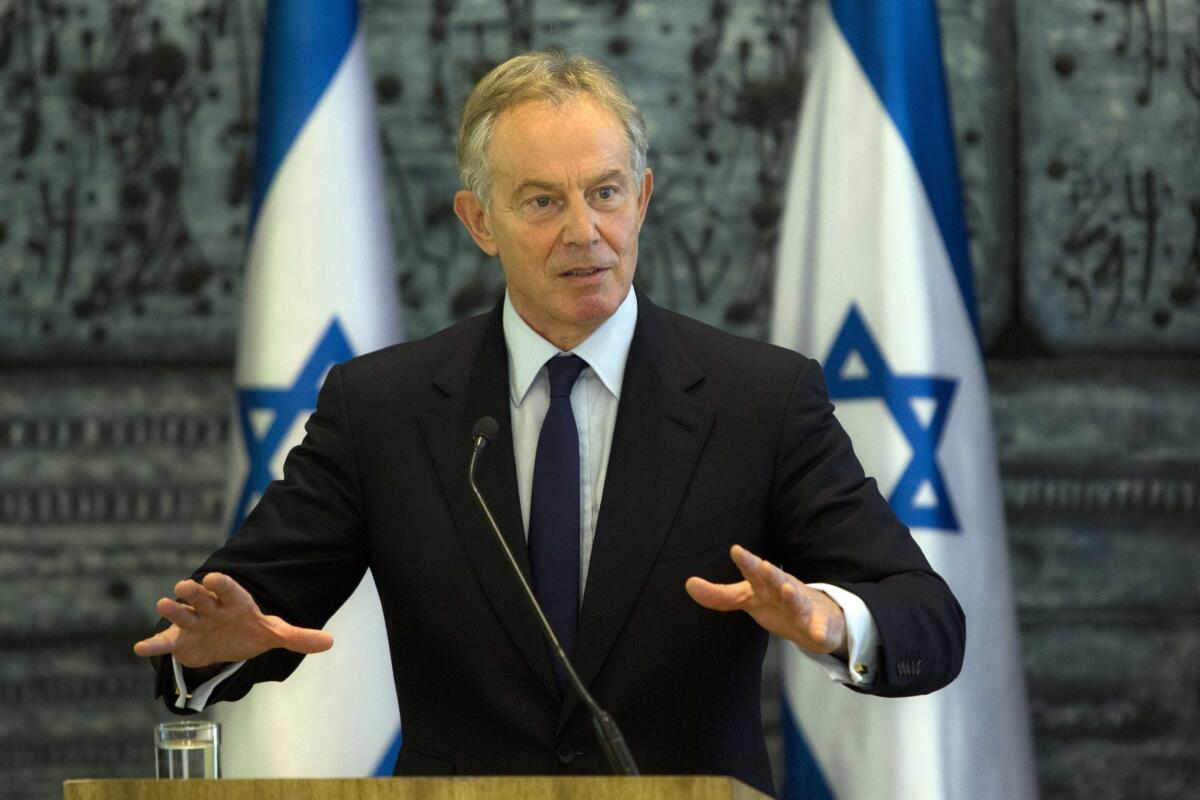Britain’s Tony Blair resigns as U.N. Middle East envoy

Former British Prime Minister Tony Blair, shown here during a Jerusalem visit in July 2014, has informed the U.N. chief that he will step down from his role as the world body’s special Middle East envoy next month, according to media reports.
Former British Prime Minister Tony Blair announced in a letter to the United Nations chief on Wednesday that he will step down as the world body’s special Middle East envoy at the end of June, British news media reported, citing unnamed diplomatic sources.
Blair, the Labor Party politician who headed Britain’s government for a decade, was appointed in 2007 as U.N. representative to the Middle East “Quartet” of special mediators that also includes seasoned diplomats from the United States, Russia and the European Union.
There was no immediate confirmation from U.N. headquarters in New York of the letter Blair was said to have written to Secretary-General Ban Ki-moon. A statement about his planned June 30 departure from the Brussels-based Ad-Hoc Liaison Committee that coordinates the Quartet’s work omitted the reason for Blair’s resignation but commended his “unwavering commitment” to the pursuit of peace.
Blair was said to have become frustrated with the limited authority of his mandate and the stalled peace process intended to negotiate a two-state solution to the intractable conflict between Israelis and Palestinians.
That frustration was evident in a report issued by Blair last week to the Liaison Committee.
“Over a year on from the breakdown in talks between Israel and the Palestinians, there is still no tangible political horizon in sight,” he wrote. “The last year has repeatedly presented us with reminders not just of where the flashpoints and difficulties persist, but also that in the absence of a political horizon, the vacuum quickly fills with animosity and violence.”
Israeli troops and Palestinian fighters in the Gaza Strip fought a 50-day war last summer that left 2,100 Palestinians, 67 Israeli soldiers and six civilians dead and destroyed thousands of houses in the impoverished Palestinian enclave.
Limited fighting has flared up at times since that conflict. On Wednesday, Israeli planes hit what the military described as four “terror infrastructure” targets in Gaza after a rocket landed 20 miles inside Israel the previous evening. The rocket attack reportedly caused no injuries.
Blair cited progress in some areas in periodic reports on his website, including helping remove dozens of Israeli checkpoints in the West Bank, facilitating a $350-million mobile phone investment project for the West Bank, easing the movement of workers and Palestinian products to markets and boosting tourism to Bethlehem.
But his assessments of the Quartet’s work have increasingly cast the prospects for a negotiated solution as grim.
U.S. State Department spokesman Jeff Rathke praised Blair for “tirelessly and passionately” pursuing peace in the region during his eight-year stint as special envoy.
Israeli Prime Minister Benjamin Netanyahu also paid tribute to what he said were Blair’s “great efforts to advance stability and peace in the region.”
Blair has apparently signaled his willingness to remain engaged in the frustrated pursuit of a lasting peace in the Middle East but wants to focus on efforts to improve the daily lives of Palestinians in Gaza.
Britain’s Guardian newspaper said Blair’s appointment eight years ago was initially cheered by the Palestinians but that they had come to regard him as “too close to the Israelis, who were then, as now, far more powerful than the Palestinians still living under occupation.”
The Quartet was founded in 2002, but its mission was largely eclipsed by a fresh initiative undertaken by the United States after President Obama entered the White House in 2009. The U.S. diplomatic bid has also foundered as persistent hostilities, and continued Israeli settlement building on land the Palestinians see as part of a future state, have brought the two sides to impasse.
Follow @cjwilliamslat for the latest international news 24/7
More to Read
Start your day right
Sign up for Essential California for news, features and recommendations from the L.A. Times and beyond in your inbox six days a week.
You may occasionally receive promotional content from the Los Angeles Times.







